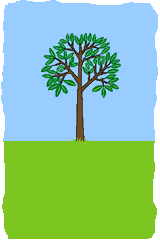 In many countries it has long been the tradition to hold an annual tree or forest festival. The origin of such celebrations dates back to antiquity and is in the dawn of religious feeling and awe for what trees represented. However, Arbor Day, as it is commonly known today, is of American origin and evolved from conditions peculiar to the Great Plains. It was first observed in Nebraska in 1872. In many countries it has long been the tradition to hold an annual tree or forest festival. The origin of such celebrations dates back to antiquity and is in the dawn of religious feeling and awe for what trees represented. However, Arbor Day, as it is commonly known today, is of American origin and evolved from conditions peculiar to the Great Plains. It was first observed in Nebraska in 1872.
The idea, conceived by J.S. Morton, then a member of the Nebraska State Board of Agriculture, was one of forest conservation. It was a move to promote replanting, following deforestation, and to plant up treeless areas. The idea has spread widely to other lands where it is variously celebrated as the 'Festival of Trees', 'Greening Week' of Japan, 'The New Year's Days of Trees' in Israel, 'The Tree-loving Week' of Korea, 'The Reforestation Week' of Yugoslavia, 'The Students' Afforestation Day' of Iceland and 'The National Festival of Tree Planting' in India. Arbor Day in its various forms is now recognised in more than fifty countries.
THE IMPORTANCE OF ARBOR DAY
On Arbor Day, particular attention is drawn to the part trees play in our lives. It's not just a day to plant trees and then forget the gesture for another twelve months. Planting a tree one day is no credit to us if, during the rest of the year, we neglect to care for it and those already growing. Our thought on Arbor Day should be an expression of enduring feeling, thought and action and not just one single, isolated flame of interest.
In schools and other community groups, this day can be celebrated in many different ways.
·By planting trees or shrubs in school grounds, along neighbouring streets or in civic parks.
·By 'adopting' a patch of bush, with the landowner's consent, and caring for it by removal of weeds, rubbish, etc, by preparing firebreaks and by fencing and making paths to reduce trampling.
·By presenting a play or mime about trees in the history of Australia.
·By completing a project about certain types of trees (eg. jarrah, boab, karri) or a famous tree like the Gloucester Tree near Pemberton.
·As a class activity or common interest group go on a visit to a bush area with a spokesperson to explain the characteristics of plant species and their niche in the natural environment.
·Collect some tree seeds, germinate them in a classroom, and plant out the seedling.
·Carry out identification of trees in a specific part of your school or neighbourhood. A tree labelling ceremony could also be arranged.
·Compile a list of everyday objects that are made of wood or wood-based materials, and find out how the wood was processed, where it came from and whatever else you can.
Trees and shrubs, whether native or introduced to WA, provide opportunities for the interest and study by the whole community, and when we walk around our own neighbourhood or drive through the countryside, we can appreciate the importance of such a diversity of plants to the well being of humanity.
“植樹節(jié)”是一些國家以法律形式規(guī)定的以宣傳森林效益,并動(dòng)員群眾參加造林為活動(dòng)內(nèi)容的節(jié)日。按時(shí)間長短可分為植樹日、植樹周或植樹月,總稱植樹節(jié)。通過這種活動(dòng),激發(fā)人們愛林、造林的感情,提高人們對(duì)森林功用的認(rèn)識(shí),促進(jìn)國土綠化,達(dá)到愛林護(hù)林和擴(kuò)大森林資源、改善生態(tài)環(huán)境的目的。是為了動(dòng)員全民植樹而規(guī)定的節(jié)日,也因?yàn)檫@是孫中山先生逝世的紀(jì)念日。
|